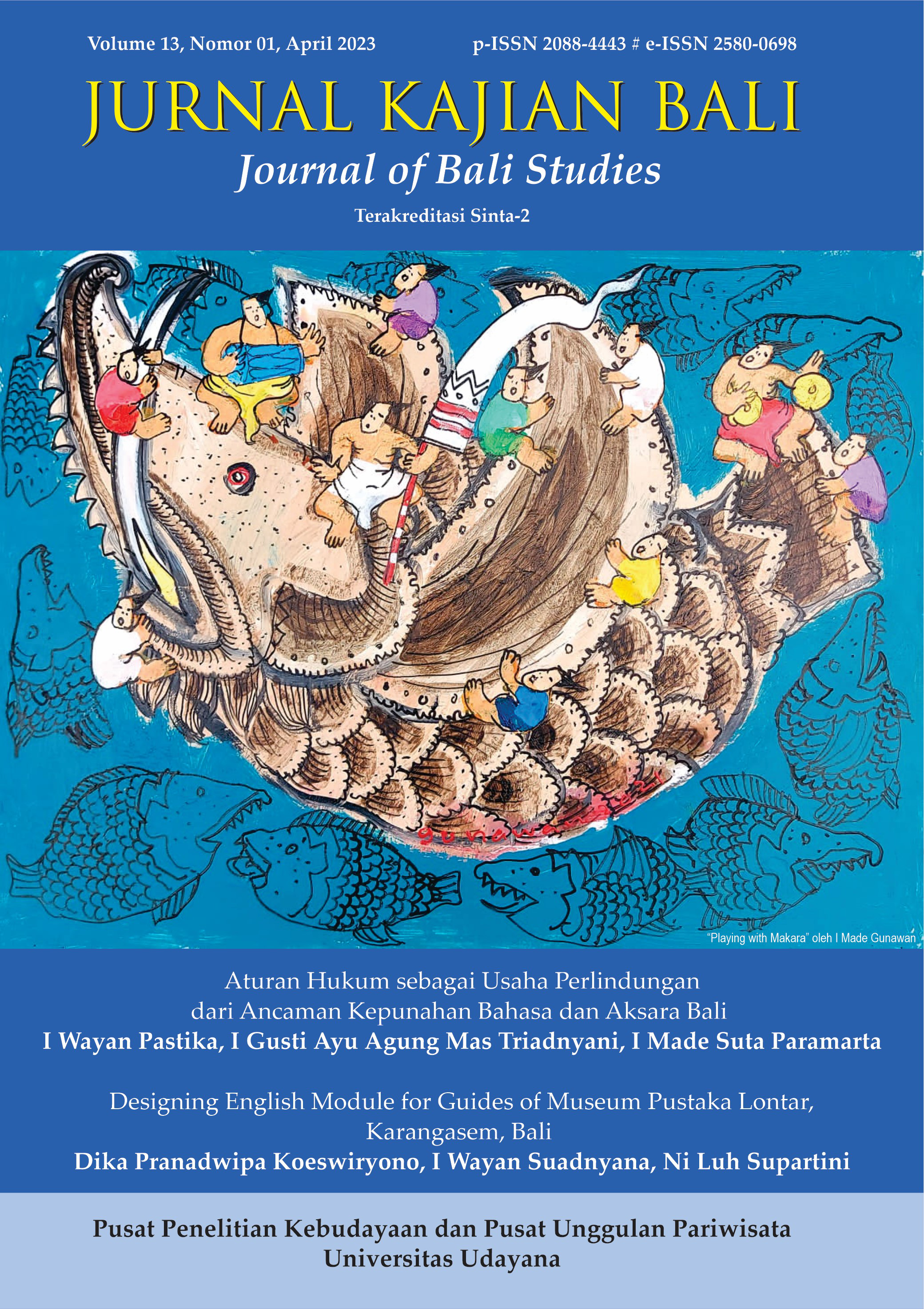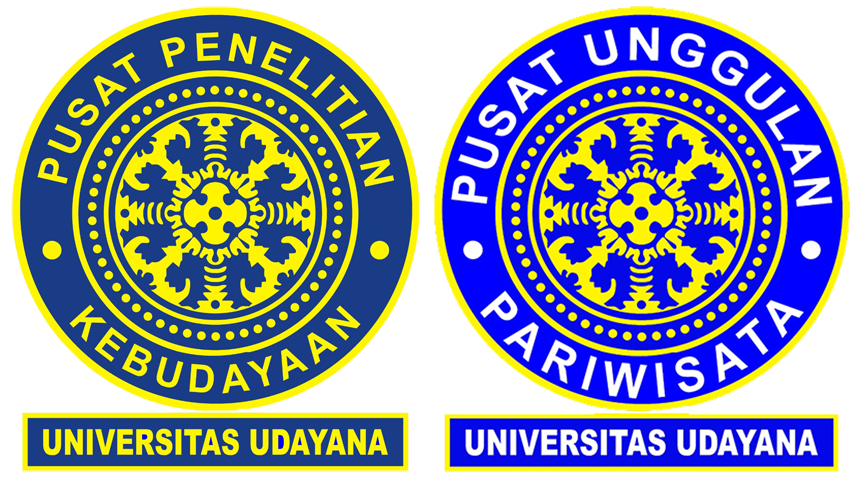Pengaruh Program CHSE terhadap Citra, Kepercayaan, Kepuasan, dan Loyalitas Pengunjung pada Masa Pandemi Covid-19 di DTW Pantai Melasti Ungasan Bali
Abstract
Implementation of the Cleanliness, Health, Safety, and Environmental Sustainability (CHSE) program at the Melasti Beach Ungasan Bali tourist destination is intended to boost visitor trust. This study examined visitor views of the implementation of CHSE at Melasti Beach and the consequent effects on destination image, trust, satisfaction, and loyalty. SEMPLS assessed data gathered through the surveying of 100 respondents. CHSE is well-implemented, and visitors trust the destination. Visitors are incredibly satisfied and loyal to the site. CHSE improves visitor trust and satisfaction but does not affect a destination's image. Image influences visitor trust but not satisfaction. Visitors' loyalty is unaffected by visitors' trust. Visitor loyalty is highly influenced by visitor satisfaction. The data reveals that the CHSE program is still vital during the COVID-19 pandemic because it boosts tourist trust and satisfaction.
Downloads
References
Ahmed, Z., Rizwan, M., Ahmad, M., & Haq, M. (2014). Effect of brand trust and customer satisfaction on brand loyalty in Bahawalpur. Journal of Sociological Research, 5(1), 306–326. https://doi.org/10.5296/jsr.v5i1.6568
Albaity, M., & Melhem, S. B. (2017). Novelty seeking, image, and loyalty—The mediating role of satisfaction and moderating role of length of stay: International tourists’ perspective. Tourism Management Perspectives, 23, 30–37. https://doi.org/10.1016/j.tmp.2017.04.001
Badan Pusat Statistik Provinsi Bali. (2020). Perkembangan Pariwisata Provinsi Bali Maret 2020. Bali.Bps.Go.Id, 2019(64), 1–8.
Bateson, John E.G dan K. Douglas Hoffman. (2011). Services Marketing. Canada: Cengage Learning.
Bové-sans, M. À., & Ramírez, R. L. (2013). Destination Image Analysis for Tarragona Cultural Heritage, 5, 103–126.
Cong, L. C. (2016). A formative model of the relationship between destination quality, tourist satisfaction and intentional loyalty: An empirical test in Vietnam. Journal of Hospitality and Tourism Management. https://doi.org/10.1016/j.jhtm.2015.12.002
Deng, Z., Lu, Y., Wei, K. K., & Zhang, J. (2010). Understanding customer satisfaction and loyalty: An empirical study of mobile instant messages in China. International Journal of Information Management, 30(4), 289–300. https://doi.org/10.1016/j.ijinfomgt.2009.10.001
Diarta, IKS dan Pitana, G. (2020). Peran Bumda dan Pokmasta sebagai Model Pengembangan Pariwisata Berbasis Masyarakat dan Implikasinya bagi Kepuasan Pengunjung. Laporan Penelitian PUU Universitas Udayana.
Ghozali, Imam. (2014). Structural Equation Modeling metode alternative dengan partial least squares (PLS). Semarang: Universitas Diponogoro
Ismail, M. A., & Safa, N. S. (2014). Trust, Satisfaction, and Loyalty Formation in Electronic Commerce. Journal of Industrial and Intelligent Information, 2(3), 228–232. https://doi.org/10.12720/jiii.2.3.228-232
Josee Bloemer, & Ruyter, K. de. (2017). On the relationship between store image, store satisfaction and store loyalty. European Journal of Marketing, 32(5), 499–513.
Kementrian Pariwisata dan Ekonomi Kreatif. (2020). Panduan Pelaksanaan Kebersihan, Kesehatan, Keselamatan, dan Kelestarian Lingkungan di Daya Tarik Wisata.
Kim, J. H. (2018). The Impact of Memorable Tourism Experiences on Loyalty Behaviors: The Mediating Effects of Destination Image and Satisfaction. Journal of Travel Research, 57(7), 856–870. https://doi.org/10.1177/0047287517721369
Kiyani, T. M., Niazi, M. R. U. K., Rizvi, R. A., & Khan, I. (2012). the Relationship Between Brand Trust, Customer Satisfaction and Customer Loyalty. (Evidence From Automobile Sector of Pakistan). Journal of Contemporary Research in Business, 4(1), 489–502.
Kozakm Metin dan Alain Decrop. (2009). Handbook of Tourist Behavior: Theory & Practice. New York: Routledge
Kusuma, I. D. G. (2020). Wacana Pariwisata Bali Dalam Pusaran Pandemi Covid-19. Jurnal Ilmiah Cakrawarti. https://doi.org/10.47532/jic.v3i2.199
Lee, T. H. (2009). A structural model for examining how destination image and interpretation services affect future visitation behavior: A case study of Taiwan’s Taomi eco-village. Journal of Sustainable Tourism, 17(6), 727–745. https://doi.org/10.1080/09669580902999204
Neal, J. D., & Gursoy, D. (2008). A multifaceted analysis of tourism satisfaction. Journal of Travel Research, 47(1), 53–62. https://doi.org/10.1177/0047287507312434
Nuruddin , Putu Eka Wirawan , Sri Pujiastuti, N. N. S. A. (2020). Strategi Bertahan Hotel di Bali Saat Pandemi Covid-19. Jurnal Kajian Bali (Journal of Bali Studies), 10(2), 579. https://doi.org/10.24843/jkb.2020.v10.i02.p11
Parvez, N., & Akbar, M. M. (2009). Impact of service quality,trust, and customer satisfaction on customer loyality. ABAC Journal, 29(1), 24–38.
Pratminingsih Sri Astuti, Christina Lipuringtyas Rudatin, T. R. (2014). Roles of Motivation and Destination Image in Predicting Tourist Revisit Intention: A Case of Bandung – Indonesia. International Journal of Innovation, Management and Technology. https://doi.org/10.7763/ijimt.2014.v5.479
Prayitno, D. (2015). Pengaruh Kualitas Pelayanan dan Reputasi Perusahaan Terhadap Kepuasan Konsumen Dengan Kepercayaan Sebagau Variabel Moderasi. Jurnal Ekonomi Dan Kewirausahaan, 15(3), 321–328.
Rajesh, R. (2013). Impact of Tourist Perceptions, Destination Image and Tourist Satisfaction on Destination Loyalty: A Conceptual Model. PASOS. Revista de Turismo y Patrimonio Cultural. https://doi.org/10.25145/j.pasos.2013.11.039
Rios, Rosa E. dan Hernan E. Riquelme. (2008). Brand Equity for Online Companies. Marketing Intelligence & Planning, Vol.26 (7) pp.719-742
Semara, M. T., & Nyoman Sunarta dan Made Sudjana. (2020). Intervensi Kebudayaan Lokal melalui Keterlibatan Pecalang dalam Mempengaruhi Penerapan Protokol Kesehatan CHSE terhadap Loyalitas Wisatawan ke Desa Budaya Kertalangu Denpasar. Jurnal Kajian Bali (Journal of Bali Studies), 10(23), 537.
Song, H., van der Veen, R., Li, G., & Chen, J. L. (2012). The Hong Kong tourist satisfaction index. Annals of Tourism Research, 39(1), 459–479. https://doi.org/10.1016/j.annals.2011.06.001
Sholihin, Mahfud dan Dwi Ratmono. (2013). Analisis SEM-PLS dengan WarpPLS 3.0 untuk Hubungan Nonlinier dalam Penelitian Sosial dan Bisnis. Yogyakarta: Andi Yogyakarta
Su, L. J., Hsu, M. K., & Swanson, S. (2017). The Effect of Tourist Relationship Perception on Destination Loyalty at a World Heritage Site in China: The Mediating Role of Overall Destination Satisfaction and Trust. Journal of Hospitality and Tourism Research, 41(2), 180–210. https://doi.org/10.1177/1096348014525630
Subadra, I. N. (2021). Cultural Tourism and the Covid-19 Pandemic: Understanding Government Policies and Balinese Reactions. Journal of Bali Studies, 11(1), 1–22.
Subekti, D. D. (2020). Pengaruh Dimensi Customer Experience dan Kepercayaan terhadap Minat Berkunjung Kembali pada Pengunjung Dira Kencong Jember. Jurusan Manajemen Fakultas Ekonomi dan Bisnis Universitas Jember.
Susilawati, S., Falefi, R., & Purwoko, A. (2020). Impact of COVID-19’s Pandemic on the Economy of Indonesia. Budapest International Research and Critics Institute (BIRCI-Journal): Humanities and Social Sciences. https://doi.org/10.33258/birci.v3i2.954
Swarbrooke, Jhon dan Susan Horner. (2007). Consumer Behavior in Tourism (Second Edition). Oxford: Elsevier Ltd
Tong, Xiao dan Jana M. Hawley. (2009). Measuring Customer-Based Brand Equity: Empirical Evidence from the Sportwear Market in China. Journal of Product & Brand Management, Vol. 18 (4), pp.262-271
Wisnawa, I. M. B. (2021). Dimensions of Bali’s Brand Loyalty as a Tourist Destination forIndonesian Tourists during the Covid-19 Pandemic. Journal of Bali Studies, 11(1).

This work is licensed under a Creative Commons Attribution 4.0 International License.



















